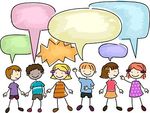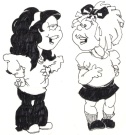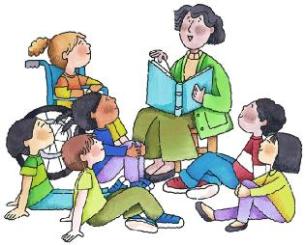Language Development in Children
By: Lauren Acosta
A child’s first form of communication is crying as a newborn. From then on, language is continuously and quickly developing. New babies are very aware of the sounds of their environment and between 0 and 3 months they know to look your way when you speak and smile when they hear a familiar voice. Babies often respond to calming tones of voice even if it isn’t familiar. Between 4 and 6 months babies begin to respond to “no” and can distinguish changes in tone of voice. Between 7 and 12 months babies will recognize names of familiar objects and begin to enjoy games, they also turn when they hear their name and listens when someone speaks to them. On average, first words are usually spoken by the age of 1. A child between 1 and 2 will also point to pictures in books when named, follow simple commands, and enjoy listening to simple stories. Between 2 and 3 years of age children begin to better understand two stage commands and notice familiar sounds like the doorbell. Children will begin to understand simple questions between the ages of 3 and 4. Between 4 and 5 comprehension of language increases vastly, they understand most of what they hear.
While the foundation of this development is established by the early elementary years, it continues all the way through adolescence and high school years. With cognitive development children become better communicators. During middle childhood grammatical understanding and construction expands and pragmatics of language improves. Children become more effective communicators between the ages of 6 and 12. From 12-18 years of age, vocabulary, comprehension, story telling abilities and the ability to hold a conversation increases dramatically.
What To Expect and How You Can Help!
|
Age Range |
Expected Development |
Ways to Help Development |
|
Birth-2 Years Old |
-Smiling and cooing
-First words by 1st birthday -Before 2nd birthday put 2 words together at a time |
-Encourage speech, speak to the child in a conversational manner with animated tones
-Ask questions -Repeat the child’s early sentences |
|
2-6 Years Old |
-Between 2nd and 3rd yr. a major advancement in vocabulary
-Between 4 & 5 yrs. the child will organize knowledge of words -At 6 yrs. Knowledge includes 8000-14000 words, use about 2600 in their speech |
-Read age appropriate books
-Encourage listening skills -Ask follow-up questions |
|
6-10 Years Old |
-Understanding of temporal words increasing
-Pronunciation mastery by 8 Yrs. -Can construct stories with plots |
-Teach irregular word forms
-Include group discussions in lessons -Encourage story telling in speech and writing |
|
10-14 Years Old |
-Able to understand complex sentences
-Carries on lengthy conversations -More aware of many terms used in several areas of academics |
-Explore the nature of words
-Encourage class debates -Use more advanced, preferred terminology |
|
14-18 Years Old |
-Refinements in grammar
-Understands figurative language -Masters a variety of connectives |
-Make sure the difference between abstract words is pointed out
-Make children aware of underlying meanings in poetry and fiction |
For more in depth information on language development visit the Child & Family WebGuide
http://www.cfw.tufts.edu/?/category/development/4/topic/language-development/78/



